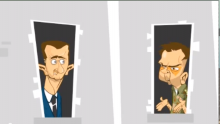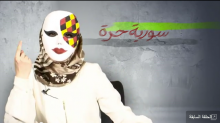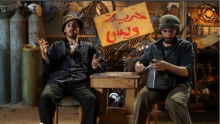Puppets take on politicians in Syria: Top Goon
As the situation in Syria has worsened, protesters have turned to subversive humour and defiant fun. This includes dancing in the street at demonstrations; sardonic spoof websites like the 'official' website of Syria's first lady, Asma al-Assad; a video explaining the uprisings by way of traditional storytelling techniques popularised in Syria in the 60s and 70s; not to mention a myriad of Youtube video mashups, such as this one featuring Syrian president Bashar al-Assad's head on top of a rapper's gyrating body, calling for citizens to join the street protests.
Top Goon: Diaries of a Little Dictator is a 13-episode series, broadcast on Youtube, created by an anonymous group of actors from within Syria who go by the name of Masasit Mati. The group, who are currently working on a second season of the show, say that their approach is one of peaceful and non-violent activism. With a simple set and finger puppet characters they impersonate Assad, along with generic figures such as 'the peaceful protester' and 'Shabih', a member of the state-sponsored militia.
Activists hold this militia responsible for most of the attacks on civilians, though Assad denies any connection to it (soon after Assad appeared on ABC news with this claim, Anonymous unveiled emails exposing how Assad had been coached on how to respond to questions about the crackdown).
Regardless of who is actually doing the killing in Syria, it is evident that the numbers are rising daily. Statistics from the Strategic Research and Communication Centre report that in the year following the uprisings, which began in March 2011, 8500 Syrians were killed and over 65 000 went missing. Masasit Mati has taken the risk not only of speaking out against the regime but also of blatantly mocking it. In one episode of Top Goon, Assad is portrayed as a contestant in a game of 'Who wants to Kill a Million', where he is up against Hosni Mubarak and Moammar Gadhafi.
While humour is a powerful way for activists to undermine institutional power, as well as often being a means of catharsis for ordinary citizens, the risk is enormous in such a turbulent political situation. Syria witnessed the brutal assault of Ali Ferzat for his cartoon satirising Assad, as well as the murder of Ibrahim Qashoush after he wrote the song 'Come on, Leave, Bashar'. While the internet may offer a greater level of anonymity than Ferzat and Qashoush had access to, it is by no means safe from surveillance (ironically revealed by Anonymous's claim that it penetrated the Syrian presidential email account with the password 12345). Vigilance with regard to digital security and privacy is crucial.
Other popular web series using humour to provoke critical discussion about Syria:
- Kaser el sha'e b (The Presidential Palace): satiric animated show by Wikisham featuring Assad, his brother and the Iranian president, among others
- Anzeh Walo Tarat (Even if the Sheep Flies): a comedic solo show presented by a woman in a mask.
- Horriyeh wo Bas (Freedom Only): comedy sketches portraying events from the perspective of demonstrators on the ground, by Maakom, a collective of Syrian youths living outside the country.
FURTHER READING
Top Goon: Puppet drama lampoons Syria's Bashar al-Assad, The Global Post, 2011.
Syrians unleash the power of creative dissent, The Wall Street Journal, 2012.
The Syrian revolution in sketches: talking to the Horriyeh w Bas team, Now! Lebanon, 2011.


